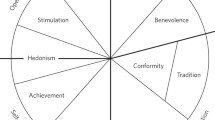Abstract
Personal values are the attitudes and beliefs held by an individual. These values are not just formed through personal experience, but are also influenced through a complex interaction of factors. Examples of influence include parents, siblings, friends, education, work, religion and the media. The existence of personal values is a critical determinant of how consumers view PSOs and the interactions which occur during the three phases of search, consumption and post-experience assessment. By acquiring an understanding of the values of private citizens, PSOs are in a much better position to design and develop an optimal service portfolio.
Access this chapter
Tax calculation will be finalised at checkout
Purchases are for personal use only
Preview
Unable to display preview. Download preview PDF.
Similar content being viewed by others
References
Allen, M.W. (2001) ‘A practical method for uncovering the direct and indirect relationships between human values and consumer purchases’, The Journal of Consumer Marketing, 18 (2), 102–20.
Anon. (2001) ‘The changing face of health care consumers’, Marketing Health Services, 21 (4), 4–10.
Berges, I., Dallo, F., DiNuzzo, A., Lackan, N. and Weller, S.C. (2006) ‘Social support: a cultural model’, Human Organization, 65 (4), 420–9.
Chaston, I. (2011) Public Sector Management: Mission Impossible? (Basingstoke: Palgrave Macmillan).
Chowdhury, M.M.U. (2009) ‘Bangladesh: an overview’, Journal of Services Research, 8 (2), 11–23.
Eisner, S.P. (2005) ‘Managing Generation Y’, S.A.M. Advanced Management Journal, 70 (4), 4–16.
Hofstede, G. (1983) ‘The cultural relativity of organizational practices and theories’, Journal of International Business Studies, 14 (2), 75–88.
Lewis, B. (2002) What Went Wrong? The Clash Between Islam and Modernity in the Middle East (New York: Oxford University Press).
Metcalfe, D. (2008) ‘Women, management and globalization in the Middle East’, Journal of Business Ethics, 83, 85–100.
Nafstad, H.E., Carlquist, E. and Blakar, R.M. (2007) ‘Community and care work in a world of changing ideologies’, Community, Work and Family, 10 (3), 329–40.
Ng, S.I., Lee, J.A. and Soutar, G.N. (2007) ‘Are Hofstede’s and Schwartz’s value frameworks congruent?’ International Marketing Review, 24 (2), 164–80.
Papalexandris, N. and Panayotopoulou, L. (2004) ‘Exploring the mutual interaction of societal culture and human resource management practices: evidence from 19 countries’, Employee Relations, 26 (5), 495–509.
Parasuraman, A. Zeithmal, V.A. and Berry, L.L. (1985), ‘SERVQUAL: a multiple item scale for measuring consumer perceptions of service quality’, Journal of Retailing, 64 (1), 12–23.
Ryman, J.A. and Turner, C.A. (2007) ‘The modern Weberian thesis: a short review of the literature’, Journal of Enterprising Communities, 1 (2), 175–87.
Sasser, W.E. (1976) ‘Matching supply and demand in service industries’, Harvard Business Review, November–December, 133–40.
Schwartz, S.H. (1994) ‘Are there universal aspects in the structure and contents of human values?’ Journal of Social Issues, 50 (4), 19–46.
Williams, K.C. and Page, R.A. (2010) ‘Marketing to the generations’, Journal of Behavioral Studies in Business, (3) 1–17.
Zeithmal, V.A. and Bitner, M.J. (1996) Services Marketing (New York: McGraw Hill).
Author information
Authors and Affiliations
Copyright information
© 2012 Ian Chaston
About this chapter
Cite this chapter
Chaston, I. (2012). Societal Values and Expectations. In: Public Sector Reformation. Palgrave Macmillan, London. https://doi.org/10.1057/9780230379350_2
Download citation
DOI: https://doi.org/10.1057/9780230379350_2
Publisher Name: Palgrave Macmillan, London
Print ISBN: 978-1-349-35097-1
Online ISBN: 978-0-230-37935-0
eBook Packages: Palgrave Business & Management CollectionBusiness and Management (R0)




